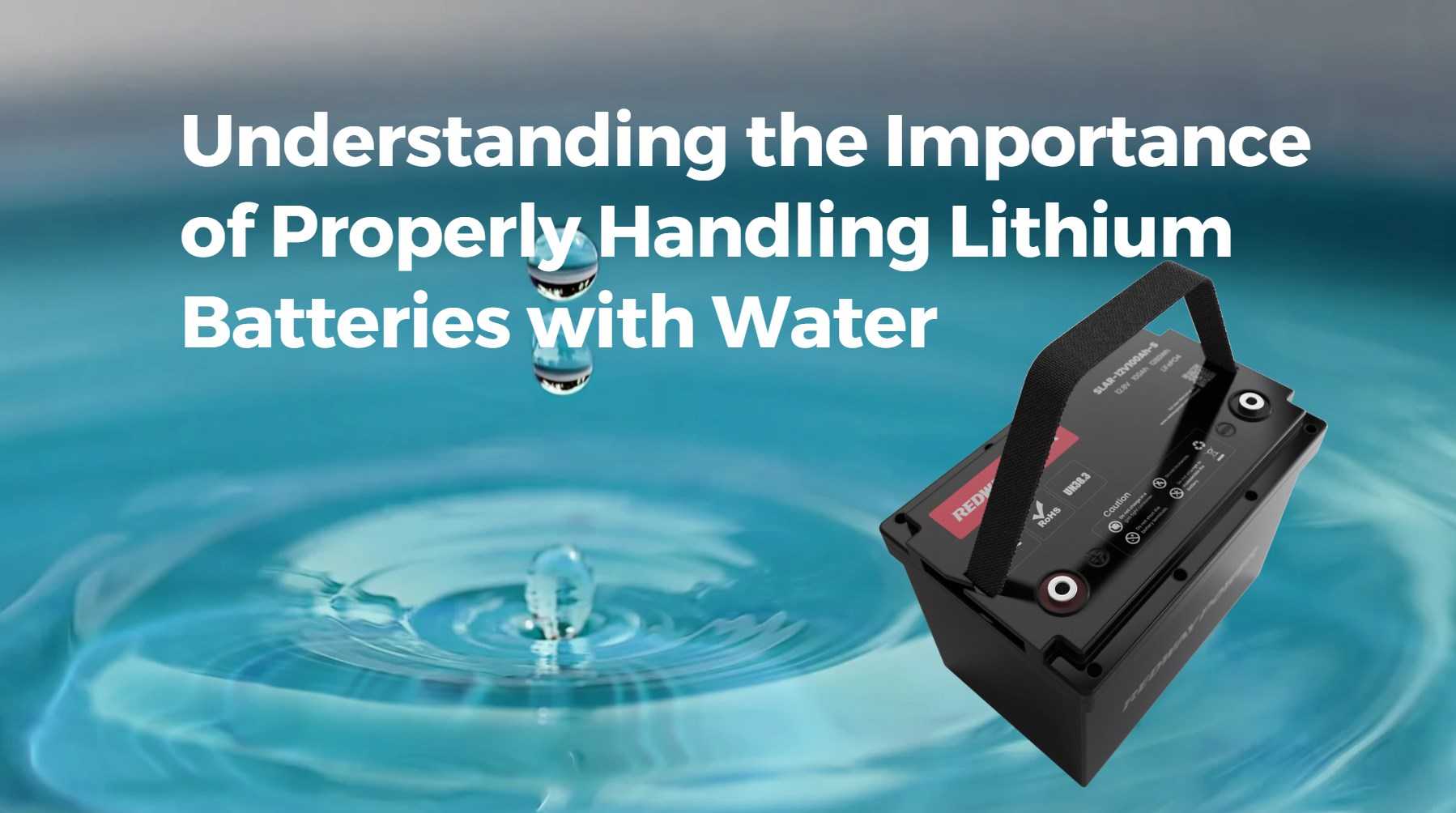
Lithium batteries are a cornerstone of modern technology, powering everything from smartphones to electric vehicles. However, their interaction with water is a critical concern. This article delves into the dangers water poses to lithium batteries, offers tips for protection, outlines best practices for storage and handling, explores alternatives, and emphasizes the significance of proper lithium battery management in the presence of water. Let’s begin our journey to ensure the safe and efficient use of these essential power sources.
How Water Affects Lithium Batteries
When water infiltrates a lithium battery, it instigates a series of detrimental reactions that can lead to heat generation, hydrogen gas release, and potential fire hazards. Upon contact with water, lithium batteries swiftly display signs of malfunction, including heat generation and the emission of smoke.
-
Detrimental Reactions: Water infiltration into a lithium battery triggers a series of detrimental reactions. This includes heat generation, the release of hydrogen gas, and the potential for fire hazards. These reactions can compromise the integrity and performance of the battery.
-
Signs of Malfunction: When a lithium battery comes into contact with water, it may exhibit signs of malfunction. This can include heat generation and the emission of smoke, indicating a compromised battery and potential fire risks.
-
Safety Precautions: To prevent water damage to lithium batteries, it is important to handle them with care and avoid exposing them to water. Proper storage, handling, and protection from moisture are essential to maintain the integrity and safety of lithium batteries.
Understanding the effects of water on lithium batteries is crucial for safety considerations. Water infiltration can lead to detrimental reactions, including heat generation, hydrogen gas release, and potential fire hazards. Recognizing the signs of battery malfunction and taking appropriate safety precautions, such as proper storage and protection from moisture, are essential for maintaining battery integrity and reducing the risk of incidents.
The Dangers of Water and Lithium Batteries
Lithium-ion battery fires are very dangerous, and water may not prevent a battery from burning and spreading. Battery cells are known to explode and quickly spread to other batteries or devices.
Tips for Protecting Your Lithium Batteries from Water Damage
To protect lithium batteries from water damage, disconnect the vehicle from the charging device, cover the charging station outlet, and move the vehicle away from flammable materials during potential flooding. Regularly check for leakage or damage, and store lithium batteries in dry locations.
-
Disconnect and Cover: In potential flooding events, disconnect the vehicle from the charging device and cover the charging station outlet to prevent water entry. This helps safeguard the battery and minimize the risk of water damage.
-
Move Away from Flammable Materials: If flooding is anticipated, move the vehicle at least 50 feet away from flammable materials. This precautionary measure reduces the risk of fire hazards and potential damage to both the battery and surrounding objects.
-
Regular Inspection: Regularly check lithium batteries for any signs of leakage or damage. Promptly address any issues encountered and follow appropriate recycling or disposal procedures as needed.
-
Dry Storage: Store lithium batteries in reliably dry locations to prevent exposure to moisture. Avoid extreme temperatures, both high and low, as they can affect battery performance and longevity.
Protecting lithium batteries from water damage requires proactive measures. Disconnecting and covering the charging station, moving the vehicle away from flammable materials, regular inspection for leakage or damage, and storing batteries in dry locations are essential steps. By following these tips, we can minimize the risks and ensure the proper functioning and longevity of lithium batteries.
Best Practices for Storing and Handling Lithium Batteries
Best practices for storing and handling lithium batteries include never charging on a soft or combustible surface, handling with care, ensuring proper ventilation in storage areas, avoiding excessive temperatures, and using the correct charger for charging batteries.

-
Charging Surface: Never charge lithium batteries on a soft or combustible surface. Use a designated charging station or a non-flammable, stable surface to minimize fire hazards.
-
Handle with Care: Treat lithium batteries with care, avoiding dropping or mishandling them. Rough handling can damage the battery casing or internal components, leading to potential safety risks.
-
Ventilation: Ensure proper ventilation in battery storage areas to dissipate any potential gas buildup. This helps prevent the accumulation of flammable gases and minimizes the risk of fire or explosion.
-
Temperature Control: Avoid exposing lithium batteries to excessive temperatures, both high and low. Store batteries within the recommended temperature range to maintain their integrity and performance.
-
Correct Charger Usage: Use the correct charger specifically designed for lithium batteries. Using incompatible chargers can lead to overcharging or overheating, posing safety risks.
Implementing best practices for storing and handling lithium batteries is essential for safety and longevity. Following guidelines such as avoiding soft or combustible charging surfaces, handling batteries with care, ensuring proper ventilation, controlling temperature exposure, and using the correct charger contributes to safe battery usage. By adhering to these practices, we can minimize risks and maintain the integrity of lithium batteries.
Alternatives to Traditional Lithium Batteries
Alternatives to traditional lithium batteries include sodium-ion batteries, solid-state batteries, lithium-sulfur batteries, magnesium batteries, and fuel cells. These alternatives offer potential benefits in terms of performance, safety, and sustainability, providing options for various applications.
-
Sodium-Ion Batteries: Sodium-ion batteries are gaining attention as a potential alternative. They offer similar performance to lithium-ion batteries but with the advantage of using more abundant sodium resources, making them potentially more sustainable.
-
Solid-State Batteries: Solid-state batteries utilize solid electrolytes instead of liquid electrolytes found in traditional lithium batteries. They offer advantages such as enhanced safety, higher energy density, and potentially longer lifespan.
-
Lithium-Sulfur Batteries: Lithium-sulfur batteries have the potential for higher energy density compared to lithium-ion batteries. They are lightweight and have a lower environmental impact, making them attractive for various applications.
-
Magnesium Batteries: Magnesium batteries are being explored as an alternative due to magnesium’s abundance and potential for higher energy density. They offer the promise of improved safety and reduced environmental impact.
-
Fuel Cells: Fuel cells are another alternative to traditional lithium batteries. They convert chemical energy directly into electrical energy, offering high energy efficiency and zero emissions. Fuel cells are commonly used in transportation and stationary power applications.
Exploring alternatives to traditional lithium batteries presents exciting possibilities for energy storage. Sodium-ion batteries, solid-state batteries, lithium-sulfur batteries, magnesium batteries, and fuel cells offer potential benefits in terms of performance, safety, and sustainability. Continued research and development in these alternative technologies contribute to a more diverse and sustainable future for energy storage solutions.
Conclusion: Understanding the Importance of Properly Handling Lithium Batteries with Water
Properly handling lithium batteries with water is essential for safety. Understanding the importance of proper use, handling, and storage helps prevent accidents and ensures worker safety. Water can have detrimental effects on lithium batteries, posing safety risks and compromising battery performance.

-
Safety Considerations: Understanding the importance of proper use, handling, and storage of lithium batteries helps prevent accidents and ensures worker safety. Adhering to safety guidelines and protocols minimizes the risks associated with water exposure.
-
Detrimental Effects of Water: Water can have detrimental effects on lithium batteries. Exposure to water can compromise battery performance, leading to potential safety risks and reduced efficiency. It is crucial to prevent water infiltration and ensure proper protection of lithium batteries.
-
Worker Safety: Proper training and education on the handling of lithium batteries with water are essential to safeguard workers’ well-being. Following safety protocols, including proper use, handling, and storage, helps prevent accidents and ensures a safe working environment.
Understanding the importance of properly handling lithium batteries when it comes to water is crucial for safety. Adhering to safety guidelines, protocols, and proper training helps prevent accidents and ensures worker safety. Recognizing the detrimental effects of water on lithium batteries highlights the significance of proper use, handling, and storage practices. By staying informed and implementing appropriate measures, we can maintain the integrity and safety of lithium batteries in various applications.



